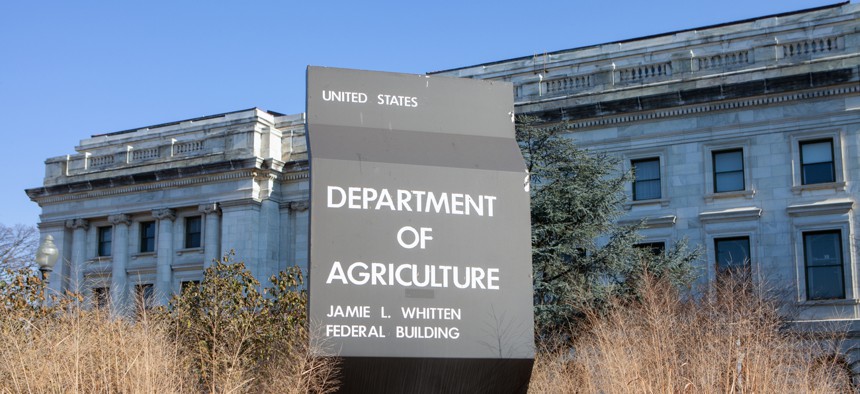
Mark Van Scyoc/Shutterstock.com
Days Before Planned Move, USDA Delays Relocation Date for Some Science Agency Employees
Feds at two research agencies have begun receiving letters pushing back the report date to Kansas City, but that decision could imperil employees' $10,000 buyouts.
Fewer than three weeks before employees at the Economic Research Service and National Institute of Food and Agriculture were expected to move to Kansas City or lose their jobs, the Agriculture Department has begun sending letters asking employees to remain in the Washington, D.C., area for a few more months.
Employees at the agencies originally had until Sept. 27 to make a final decision about whether to accept their relocation orders, and those who accepted were expected to report to temporary office space at the Beacon Center in Kansas City, Mo., on Sept. 30. But for a few dozen workers, that may no longer be the case.
Sample versions of letters sent to employees, reviewed by Government Executive, indicate that the department is delaying the move date—or separation date, for those who decline to relocate—until Dec. 9 in some cases, and March 30, 2020, in others.
“Upon further consideration of the timing of the move to Kansas City, Missouri, NIFA has determined that it is in the agency’s best interest to delay your report date until March 30, 2020,” the letter states. “This determination was made because your specific expertise is essential to ensure delivery of time sensitive functions.”
Peter Winch, who has been negotiating with management on behalf of ERS and NIFA employees in his role as special assistant to the national vice president of the American Federation of Government Employees, said so far only NIFA employees have received the letters.
A department spokesperson told Government Executive that some workers at both ERS and NIFA will relocate or leave the agency later than initially planned. At ERS, nine employees who agreed to relocate and 15 who have declined will report or leave federal service by December 9. The relocation date will be March 30, 2020, for six NIFA employees who accepted relocation orders and 38 employees who declined.
“With mission continuity as a high priority, the department has instructed ERS and NIFA to be agile with all available resources to meet workforce needs,” the spokesperson said. “The department has maintained from the onset that it would continuously evaluate needs on a case-by-case basis as well as evaluate the impact those needs have on agencies’ mission-critical work. The extension, in addition to prioritizing hiring for vacancies occurring on these teams, will help achieve mission continuity during the relocation so the department can deliver timebound functions and continue to do right by those it serves.”
But while the extension means employees who have declined to move have a longer period before they have to leave the agency, it could imperil their $10,000 buyout or early retirement payments. Since the original Voluntary Early Retirement Authority and Voluntary Separation Incentive Payments were contingent on an employee leaving federal service in the last week of September, the extension moves that window to the last week before their work unit's new report date.
"If you have applied for the [VERA and VSIP], you are aware that the receipt of the VERA and/or VSIP was contingent upon your separation from NIFA during a very specific window of time," the letter states. "Should you accept the VSIP and separate before Monday, March 16, 2020, or after Friday, March 27, 2020, the VSIP incentive and any associated VERA will be revoked. All other terms and conditions of the VERA and/or VSIP remain the same."
For those whose new report date is Dec. 9, employees wishing to preserve their buyout payments must leave the agency between Nov. 25 and Dec. 6.
The spokesperson said that at ERS, those receiving extensions do work that is “tied to specific and specialized IT needs. And the NIFA workers were given extensions based on the fact that their work “is timebound” to the first half of the new fiscal year, which begins in October.
“By extending the report date for these three teams, NIFA can continue to maintain its level of service to those who depend on its functions, while ensuring critical knowledge transfer to new staff hired in Kansas City.”
The department spokesperson did not answer questions regarding how the extensions may impact whether the department has the legal authority to implement the relocation. The House version of the agriculture appropriations bill for fiscal 2020 explicitly blocks funds from being used to relocate ERS or NIFA outside of the D.C. region.
A spokesperson for Rep. Sanford Bishop, D-Ga., chairman of the House Appropriations subcommittee for Agriculture, Rural Development, Food and Drug Administration, and related agencies, did not respond to a request for comment Thursday.
In a statement, Rep. Jennifer Wexton, D-Va., said the latest development in the relocation saga is further evidence that moving to Kansas City is a bad idea.
“The relocation of ERS and NIFA was always meant to shut down independent and objective research—because facts are inconvenient for this administration,” Wexton said in a statement. “Clearly, there are critical services that ERS and NIFA must provide, and the deliberate decimation of USDA’s workforce makes it impossible to do so.”







